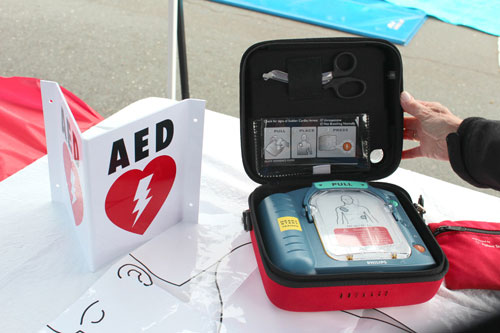
On September 29, Chris Amaro, a custodian at Scott Lane Elementary School, suffered a cardiac arrest during school hours. A parent jumped in to revive Amaro with CPR. A paramedic treated him with an AED, an automated external defibrillator. His life was saved.
“My situation could’ve happened to anyone, and I was fortunate to be in the Scott Lane community when it happened,” says Amaro, who has served the school for 34 years. “[Since the incident], I have been out every day promoting CPR and AED awareness.”
On November 22, SCUSD hosted a Survivor and Heroes Ceremony and CPR Community Event at Scott Lane School. Over 130 attendees received CPR and AED training. Recognized in a ceremony were Amaro, the paramedics who responded to the 911 call, bystanders who helped, and Marisa Carlini, the parent who performed CPR on him.
By chance, Carlini was present when Amaro had the cardiac arrest. Usually, her son, Matteo, walks to school. But that day, he was on his way to a weeklong science camp. So Carlini drove him.
“I was talking with Chris outside and then he went into the cafeteria,” she recalls. “A few minutes later, I heard people calling for help in the cafeteria. I identified myself as a nurse and asked if I could help. They said yes. I went in, and I saw Chris on the floor unconscious. I started CPR on Chris, and I saved his life.”
Organizing the community event was Angie Scott, SCUSD’s AED coordinator and the elementary school program’s P.E. coordinator. Sadly, Scott’s mother, a former SCUSD teacher, passed away from cardiac arrest after school on the day she signed her retirement papers. Therefore, Scott is very passionate about the school district’s AED program.
“We have 69 AEDs within the district, and every campus has at least one,” Scott says. “We have an M.O.U., or memorandum of understanding, with the city and fire department to help monitor and keep our equipment up to standard and to run a program that stays under the Good Samaritan Law.”
Scott explains how CPR and AED use can help someone suffering from a cardiac arrest.
“The CPR keeps somebody in a holding pattern to deliver oxygen to the brain, and the defibrillator can get the heart beating again; so the two go hand in hand,” Scott says. “When someone goes down in a cardiac arrest, CPR should be started immediately to keep oxygen going to the brain, while someone else is retrieving an AED. After the AED pads are applied to the bare skin on the chest, you have to stand clear while the AED does its job. You can’t touch the person or you will be shocked.”
“The AED is the only device that can reset the heart,” Scott continues. “I compare it to how when your computer freezes, you shut it down, wait a few seconds, and reboot. And that is what happens with an AED and a heart during a cardiac arrest. The heart is shaking, fibrillating, and the shock from the AED stuns it. Hopefully the natural pacemaker takes over and starts the heart beating again normally.”
The school district’s AED program costs $8,500 a year to maintain. Although several groups have contributed to the sustainability of the program, the school district is always looking for partnerships to continue this lifesaving effort made available to anyone on a school campus who needs it.
“Anyone can be a hero if they learn CPR and how to use an AED,” Carlini says. “Separate from [the community event], all the fifth grade students at Scott Lane Elementary School will learn CPR and the use of the AED.”
